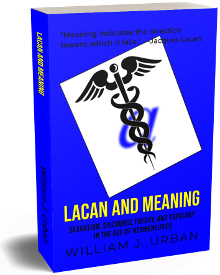LACAN AND MEANING
SEXUATION, DISCOURSE THEORY, AND TOPOLOGY IN THE AGE OF HERMENEUTICS
CHAPTER 2
WITHDRAWALS FROM MEANING
— page 32 —
Section 2.1 begins with an account of Husserl’s break with 19th century epistemology to establish phenomenology, a new philosophical approach deemed rigorously scientific. It then examines three interpretive schools Husserl inspired: phenomenological aesthetics, phenomenological criticism, and reception theory. Section 2.2 first introduces Saussure’s structuralism, a discipline also formed at the turn of the last century. Late structuralist work is then examined, inclusive of Jakobson, Derrida and Foucault. The focus for both sections is on the way these two disciplines conceive the constitution of meaning. Section 2.3 discusses contemporary developments in the older tradition of aesthetics, particularly with respect to Kant. It takes up aesthetic theorists like Baudrillard and Rancière, who seek to antagonize disruptions to the meaningful experience of art, as well as others like Deleuze and Nancy, whose work raises the possibility of sustaining these disruptions in a more permanent fashion.
2.1 Phenomenology
Meanings inspired only by remote, confused, inauthentic intuitions – if by any intuitions at all – are not enough: we must go back to the ‘things themselves.’
—Edmund Husserl
With these words the dawn of the 20th century was greeted by the emergence of phenomenology. Its etymological root in the Greek word phainomenon [appearance] already suggests what it entails: a methodological shift from studying the external world of objects to instead focus on the way these objects appear to the subject. Husserl’s call to treat the object not as fact but only as it appears – as a phenomenon – challenged the epistemology of natural science. But it also broke with Kant. For no longer was the phenomenal appearance of an object considered a failed encounter with the noumenal realm. The supposed noumenal limitation on the constitution of phenomena, which proved a stumbling block for Kant, was effectively removed, since the phenomenal world alone was now reality itself and not just the reality we can know. A new emphasis was thus placed on the subjective experience of phenomena. Indeed, phenomenology is sometimes called the ‘philosophy of experience.’ Phenomenologists accordingly task themselves with describing the structures of this experience, particularly at the level of consciousness. As already seen, Heidegger’s ontologization of this experience amounts to a rejection of the subject-object schema. But his former teacher Husserl found it indispensable when attempting to account for the phenomenon of meaning itself. Below the Husserlian notion of meaning and its constitution is recounted, as per the Logical Investigations. A few interpretive schools this original architecture engendered are also considered for their textual approaches.
« prev next »full text of Lacan and Meaning
FREE Lacanian-themed puzzles

